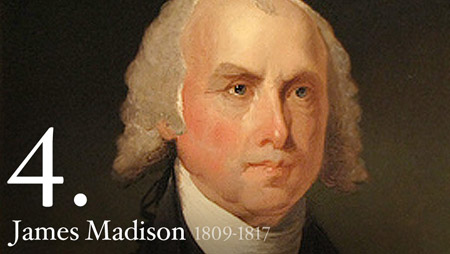
"It is in vain to oppose constitutional barriers to the impulse of self-preservation. It is worse than in vain; because it plants in the Constitution itself necessary usurpations of power, every precedent of which is a germ of unnecessary and multiplied repetitions."
When the 36 year-old James
Madison left his father's home in Virginia to join George
Washington and Benjamin Franklin in Philadelphia in May 1787 to
write a new constitution for the thirteen former colonies, the
grave uncertainties that lay ahead cast this political wunderkind
into a gloomy state of mind. He had spent the previous six
months sequestered in a room at Montpielier preparing to meet the
challenges of this momentous occassion in the young nation's
history. This short, aristocratic hypochondria - who would
never tip the scales pas a hundred pounds - emerged finally from
his monkish seclusion and confided to members of his faily that he
was likely embardking on a fool's errand, but no one approached the
city of brotherly love with a finer arsenal of intellectual
weapons. Beginning with Thucydides and Xenonphon, Plutarch
and Tacitus, Madison had read everything (in the original Greek and
Latin) that had been written on the Greco-Roman experiments in
republican government and democracy. In two thousand years,
he decided, little had changed. the central problem of governance
in a republical society was still a profoundly human one: how to
divide power without creating fatal gealousies among "equal"
states, equal persons? If there was to be life for the
republid after the Articles of Confederation, this ws the
insurmountable difficulty that must be solved.
Click here for more on the "father of the U.S.
Constitution"
Madison's brilliance in
navigating the thicket of conflicting ideas and beliefs in
Philadelphia in 1787 was singular in importance to the writing of
the U.S. Constitution. Called the "father of the
Constitution," Madison, one of the least known founders, went
on to become Thomas Jefferson's secretary of state, and the fourth
president. While his greatest achievement may have been his
contributions to the U.S. Constitution, many believe that his
finest gift to democracy was the work he and Alexander Hamilton
published in The Federalist Papers.
Related People
Related Events
Related Flashpoints